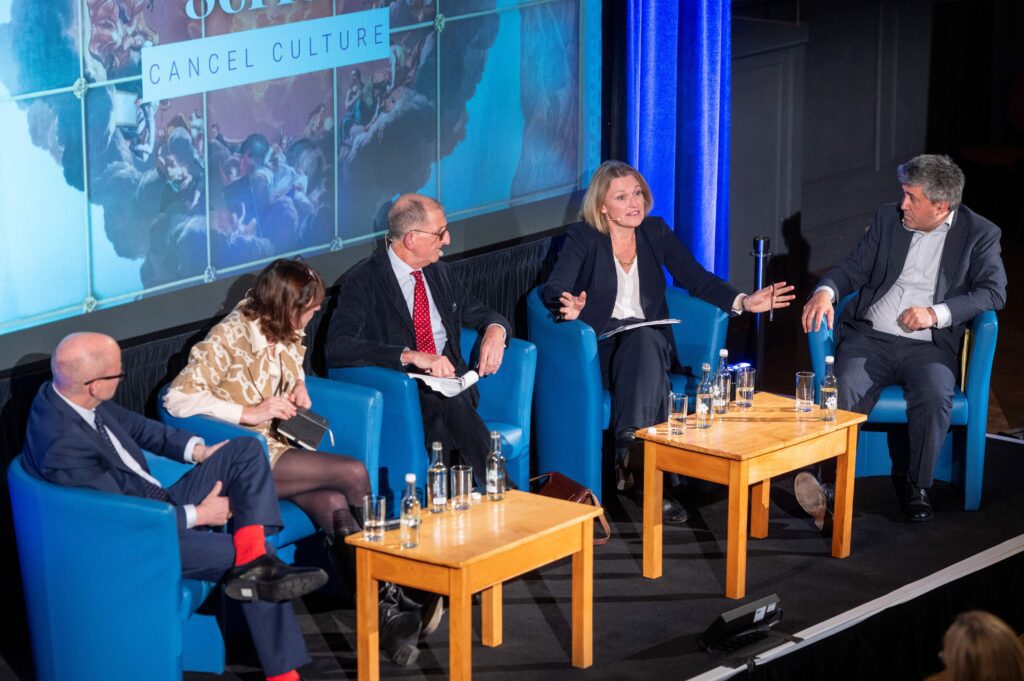A large audience gathered at the Sheldonian Theatre on Tuesday 21 October to hear invited panellists share enthusiastic discourse on a diverse range of views about ‘Cancel Culture’ for the latest event in the Sheldonian Series, which is open to all and aims to promote freedom of speech and inclusive inquiry.
I felt this Sheldonian Series event at the University of Oxford, by seeking to model what it means to secure free speech in principle and practice, offered a potential glimpse of a constructive next phase of how we can talk about free speech
Sunder Katwala
The Vice-Chancellor opened the event and the discussion was moderated by David Isaac, Provost of Worcester College.
Panellists:
- Sunder Katwala – Director of the British Future think tank
- Helen Mountfield KC – Principal of Mansfield College and trustee for Index on Censorship
- Zoe Williams – Journalist, columnist and author at The Guardian
- Lord Young of Acton – General Secretary of the Free Speech Union and Conservative peer
The panel enjoyed a lively exchange of ideas about free speech on topics including political party Reform, the influence of social media, antisemitism, the current political landscape in America and racism in football.
Talking points also focused on the First Amendment of the US Constitution and its protection of freedom of speech, the culture of exclusion and a framework for curious cultures to disagree well, to what extent democratic freedom should be given to individuals who want to use it to undermine democracy, the relationship between what you can say and what you should say, and the weaponisation of process.
Effectiveness of censorship
A roving microphone ensured the evening was interactive, with audience members sharing pre-submitted questions as well as reaction to the debate, including one student who asked the panel for their views on whether discussion around cancel culture benefits one political party over another. At the end, there was also time for a Q&A, with further interrogation over the effectiveness of censorship.
Tim Soutphommasane, Chief Diversity Officer at the University of Oxford, provided the closing remarks.
Professor Irene Tracey CBE, FRS, FMedSci, Vice-Chancellor of Oxford University said: ‘It was wonderful to welcome such a large audience to the first Sheldonian Series event of this academic year. We established this series last year as a forum to promote freedom of speech and inclusive dialogue, which is at the heart of what we do and who we are as a university. We debate diversity of thought and ideas based on reason, fact and truth with respect, kindness and generosity of spirit. This year the Sheldonian Series is dedicated to the theme of “Power” and I am grateful to all the panellists for joining us in a lively exchange of views on “Cancel Culture” for our Michaelmas term event.’
A true exchange of ideas and perspectives is essential for a plural, participatory democratic society
Helen Mountfield KC
Panellist Helen Mountfield KC said: ‘A true exchange of ideas and perspectives is essential for a plural, participatory democratic society. But upholding genuine freedom of expression for everyone requires some form of moderation. I participated in this event because I wanted an open curious discussion about where the boundaries should be, whether enforcement is social, political or legal, and how we protect the right to receive and impart ideas for everyone’.
Panellist Sunder Katwala, Director of British Future, a non-partisan thinktank and charity that focuses on issues of identity, said: ‘The “cancel culture” debate is often about the sharpest culture clashes about democracy and identity. Our leading universities can often expect to find themselves at the epicentre of these debates – since they have always been key sites of how arguments about ideas, power and voice play out between and within different generations. How universities can get their role in this right will matter for our broader democratic culture.
 Sunder Katwala
Sunder Katwala
Image: University of Oxford/John Cairns Photography
‘When I look across the Atlantic to America, I see the stark costs and the risks to democratic institutions if an ever more heated politics seems to turn opponents into enemies, shrinking civil disagreement and making any sense of common ground feel ever more elusive. Few people in Britain will want to emulate or import that increasingly violent polarisation. Political leaders and other voices in the media, civic society and higher education can play a role in fuelling or defusing conflict in how we debate and disagree.
‘I felt this Sheldonian Series event at the University of Oxford, by seeking to model what it means to secure free speech in principle and practice, offered a potential glimpse of a constructive next phase of how we can talk about free speech. Several of the closing contributions indicated that it could be time to put at least as much energy on what it means to ‘call in’ as to ‘call out’ – to focus more on proactively promoting a confident culture of free speech in volatile times.’
The Sheldonian Series this academic year is centring around issues relating to ‘Power’. Termly events will continue with ‘Activism’ in Hilary term (Wednesday 4 February 2026) and on the theme of ‘Satire’ in Trinity term (Wednesday 20 May 2026). Find out more and register your interest at Sheldonian Series | University of Oxford.

